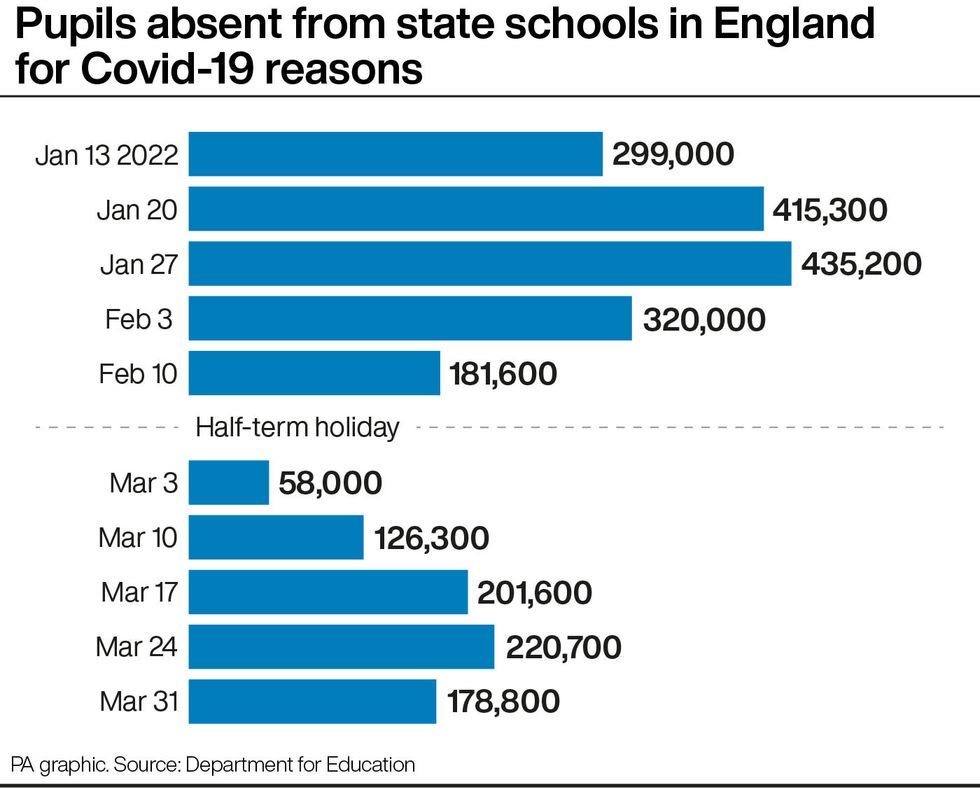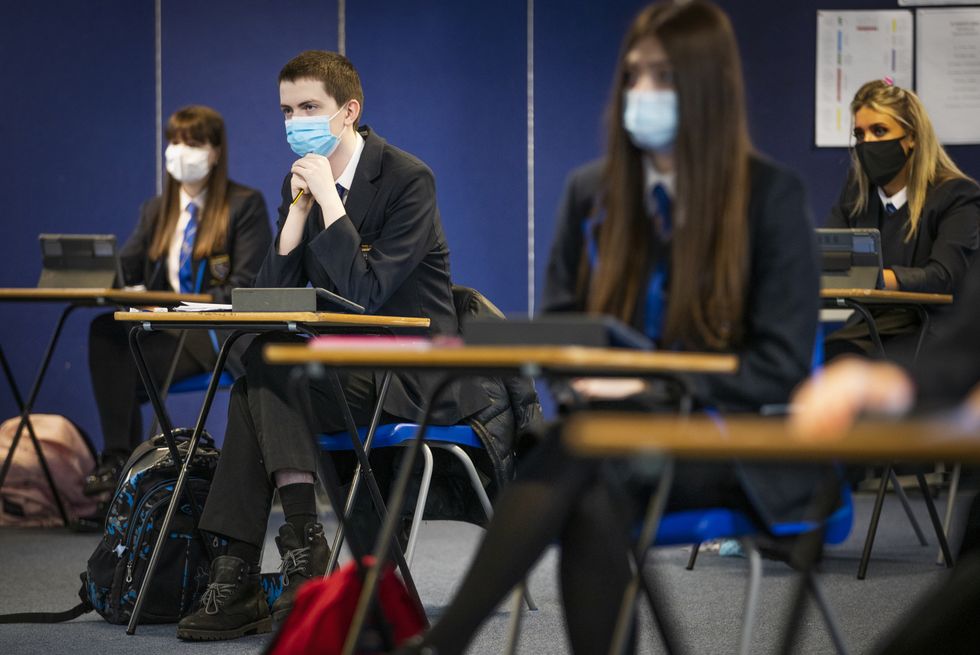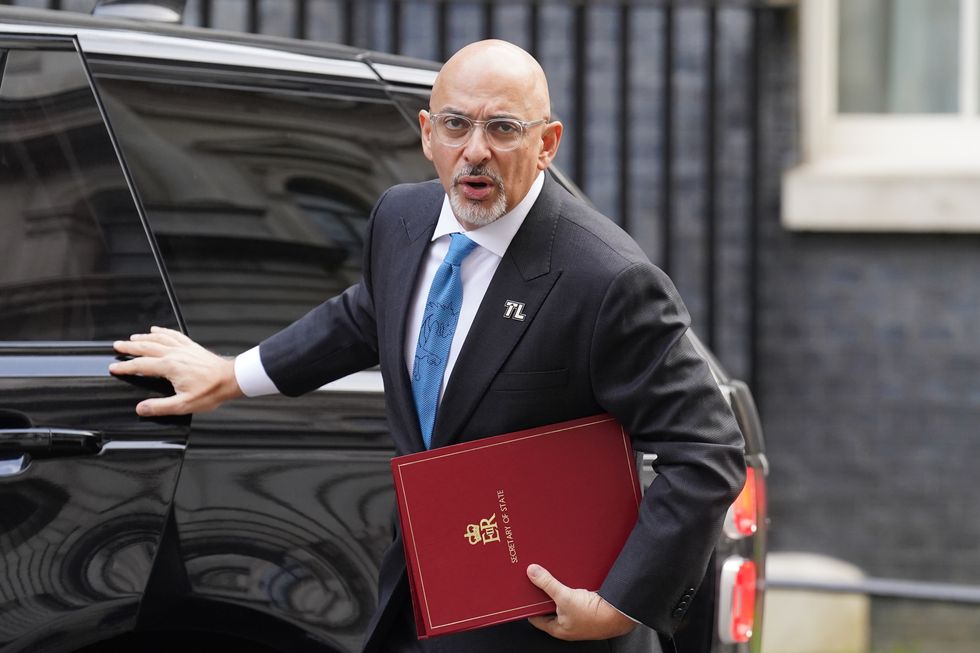Covid hits schools with nearly 180,000 pupils off sick
8.7 percent of teachers and school leaders were also absent for any reason on March 31
Don't Miss
Most Read
Nearly 180,000 pupils are off school due to Covid-19, new data from the Department of Education has revealed.
Pupil absences have slightly fallen over the past fortnight, but education leaders say schools are now at “breaking point”.
The data showed that 178,800 pupils were off school because of Covid, while an estimated 8.7 percent of teachers and school leaders were absent for any reason on March 31, down from 9.1 percent two weeks ago.
The data showed that overall pupil attendance was down from 89.7 percent on March 17 to 88.6 percent on March 31. In total, 34,300 pupils were absent from schools because of attendance restrictions in place to manage a Covid outbreak.
Pupils absent from state schools in England for Covid-19 reasons
PA Graphics
In total, 20 percent of all state-funded schools had more than 15 percent of their teachers and school leaders absent for any reason on March 31, down from 23 percent on March 17, while the proportion of schools with up to 5 percent of their teachers and school leaders absent rose from 37 percent on March 17 to 40 percent on March 31.
School leaders have said they are still very concerned by the ongoing disruptions caused by Covid, and on Monday both the NAHT school leaders’ union and the Association of School and College Leaders (ASCL) called for Education Secretary Nadhim Zahawi to reinstate free lateral flow tests for pupils and staff.
The open letter, from general secretaries Paul Whiteman and Geoff Barton, said that their members had reported greater Covid-related disruption in their schools and colleges over the last few weeks “than at any previous point during the pandemic” and that for many members it could prove the “final straw”.
Students during an English Literature class at St Andrew's RC Secondary School in Glasgow
Jane Barlow
It added that “in the face of this extensive and ongoing disruption” the decision to remove free Covid lateral flow tests for nearly all pupils and staff “feels reckless in the extreme”.
Mr Whiteman said: “We continue to hear a sense of deep frustration from school leaders as they struggle to deal with the significant and ongoing disruption caused by Covid – whilst the Government removes every measure they have for controlling it.
“We all assumed ‘living with Covid’ meant there would be very low case levels – this is clearly not the case and absence rates remain at concerningly high levels. School leaders feel they have been abandoned.
“The ongoing risk of illness and chaos caused by staff absence, not to mention the mounting pressure of exams, SATs and Ofsted, is unsustainable. Our members and education are at breaking point.”
Education Secretary Nadhim Zahawi arriving in Downing Street, London for a Cabinet meeting
Stefan Rousseau
Jon Andrews, head of analysis at the Education Policy Institute (EPI), said: “It is clear that the impact of the pandemic has not been evenly felt by all pupils, with different pupil groups and regions facing greater challenges than others.
“Our research has shown that it is pupils from disadvantaged backgrounds and those living in parts of the North and the Midlands who have been hardest hit.
“Pupil and staff absences continue to cause disruption and it is likely that the effects will be inconsistent between schools. This raises questions about how the Department for Education and Ofsted should interpret school performance measures for this year.”
Geoff Barton, general secretary of the ASCL, said he was pleased to see there appeared to have been a “slight fall” in the number of pupils absent because of Covid, as well as a “small fall” in staff absence.
“However, the situation remains grave with very severe disruption continuing in many schools and colleges,” he said.
“These figures show that a fifth of schools had more than 15 percent of their teachers absent last week. It is very difficult to operate in these conditions.
“The Government’s decision to withdraw free testing in such circumstances is a retrograde step, particularly with exams a few weeks away, and we have repeatedly urged ministers to reconsider.”
Mr Barton said he understood the Government’s “desire to declare Covid over and done with, but that is simply not the reality in schools and colleges, where the illness continues to be a real problem because of the impact on both pupils and the workforce”.














